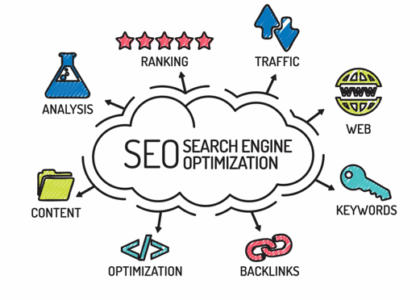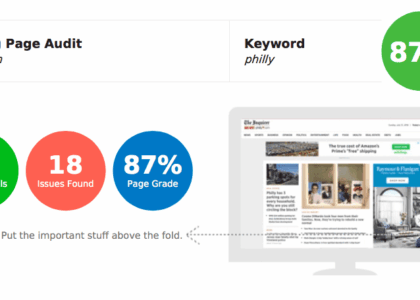The Importance of Search Engine Marketing Analysis
Search Engine Marketing (SEM) is a crucial component of any digital marketing strategy. It involves promoting websites by increasing their visibility in search engine results pages through paid advertising methods such as Pay-Per-Click (PPC) campaigns. However, simply running SEM campaigns is not enough; regular analysis is essential to ensure optimal performance and return on investment.
Benefits of SEM Analysis:
- Performance Evaluation: By analysing SEM data, marketers can evaluate the performance of their campaigns, including click-through rates, conversion rates, and overall ROI. This information helps in identifying what is working well and what needs improvement.
- Keyword Effectiveness: SEM analysis allows marketers to determine which keywords are driving the most traffic and conversions. This insight helps in refining keyword strategies for better targeting and cost-effectiveness.
- Competitor Insights: Analysing SEM data can provide valuable insights into competitors’ strategies, including their ad copy, keyword selection, and bidding tactics. This information can be used to refine your own campaigns and stay ahead in the competitive landscape.
- Budget Optimization: Through thorough analysis, marketers can identify areas where budget allocation can be optimised for maximum impact. This includes identifying underperforming keywords or ads that can be paused or adjusted to improve overall campaign efficiency.
Tools for SEM Analysis:
There are various tools available to aid in SEM analysis, such as Google Analytics, Google Ads (formerly AdWords), Bing Ads, and third-party analytics platforms. These tools provide detailed insights into campaign performance metrics, audience behaviour, and conversion tracking to help marketers make informed decisions.
Conclusion
In conclusion, search engine marketing analysis is essential for maximising the effectiveness of SEM campaigns. By regularly evaluating performance metrics, refining keyword strategies, gaining competitor insights, and optimising budgets, marketers can drive better results and achieve their digital marketing goals efficiently.
Essential FAQs on Search Engine Marketing Analysis for Enhanced Campaign Performance
- What is search engine marketing analysis?
- Why is search engine marketing analysis important for businesses?
- How does search engine marketing analysis help in improving campaign performance?
- What are the key metrics to consider in search engine marketing analysis?
- How can SEM analysis help in identifying effective keywords for campaigns?
- What tools are commonly used for conducting search engine marketing analysis?
- How does competitor analysis play a role in SEM analysis?
- What are the benefits of budget optimization through SEM analysis?
- How often should SEM campaigns be analysed for optimal results?
What is search engine marketing analysis?
Search engine marketing analysis refers to the process of evaluating and interpreting data related to search engine marketing campaigns. It involves examining various metrics such as click-through rates, conversion rates, keyword performance, and competitor strategies to gain insights into the effectiveness of SEM efforts. By conducting thorough analysis, marketers can identify strengths and weaknesses in their campaigns, make informed decisions on budget allocation and keyword targeting, and ultimately improve the overall performance of their SEM initiatives. In essence, search engine marketing analysis is a vital tool for optimising SEM strategies and achieving desired outcomes in the competitive digital landscape.
Why is search engine marketing analysis important for businesses?
Search engine marketing analysis is crucial for businesses as it provides valuable insights into the performance and effectiveness of their online advertising efforts. By conducting thorough analysis, businesses can evaluate the success of their SEM campaigns, identify areas for improvement, and make data-driven decisions to optimise their strategies. Understanding which keywords are driving traffic and conversions, monitoring competitor activities, and optimising budget allocation are just a few reasons why SEM analysis is essential. Ultimately, by leveraging the insights gained from SEM analysis, businesses can enhance their online visibility, increase website traffic, and achieve better return on investment in their digital marketing initiatives.
How does search engine marketing analysis help in improving campaign performance?
Search engine marketing analysis plays a crucial role in enhancing campaign performance by providing valuable insights into various aspects of the SEM strategy. By analysing key performance metrics such as click-through rates, conversion rates, and ROI, marketers can identify what is working well and what needs adjustments. This data-driven approach enables them to refine keyword strategies, optimise ad copy, and allocate budgets effectively to maximise results. Additionally, SEM analysis helps in understanding audience behaviour, competitor tactics, and market trends, allowing marketers to make informed decisions that drive better campaign performance and ultimately achieve their marketing objectives efficiently.
What are the key metrics to consider in search engine marketing analysis?
In search engine marketing analysis, there are several key metrics that marketers should consider to evaluate the performance and effectiveness of their campaigns. Some of the most important metrics include click-through rate (CTR), conversion rate, cost per click (CPC), return on ad spend (ROAS), quality score, impression share, and bounce rate. These metrics provide valuable insights into how well a campaign is performing, the relevance of keywords and ad copy, user engagement levels, and overall return on investment. By closely monitoring and analysing these key metrics, marketers can make data-driven decisions to optimise their SEM campaigns for better results and success.
How can SEM analysis help in identifying effective keywords for campaigns?
SEM analysis plays a vital role in identifying effective keywords for campaigns by providing valuable insights into the performance of different keywords. Through SEM analysis, marketers can evaluate metrics such as click-through rates, conversion rates, and cost-per-click for each keyword used in their campaigns. By analysing this data, marketers can identify which keywords are driving the most traffic and conversions, allowing them to focus their efforts on those that yield the best results. Additionally, SEM analysis enables marketers to uncover new keyword opportunities based on search trends and user behaviour, ensuring that their campaigns are optimised for maximum impact and relevance.
What tools are commonly used for conducting search engine marketing analysis?
When it comes to conducting search engine marketing analysis, several tools are commonly used to gather valuable insights and make data-driven decisions. Some of the popular tools in the industry include Google Analytics, Google Ads (formerly known as AdWords), Bing Ads, SEMrush, Ahrefs, and Moz. These tools provide marketers with a wealth of information such as keyword performance, ad campaign effectiveness, competitor analysis, and audience behaviour. By leveraging these tools effectively, marketers can fine-tune their SEM strategies for optimal results and stay ahead in the competitive digital landscape.
How does competitor analysis play a role in SEM analysis?
Competitor analysis plays a significant role in SEM analysis by providing valuable insights into competitors’ strategies, performance, and market positioning. By examining competitors’ SEM campaigns, including their choice of keywords, ad copy, bidding strategies, and overall approach to search engine marketing, marketers can gain a deeper understanding of the competitive landscape. This insight allows them to identify opportunities for improvement in their own campaigns, refine keyword targeting for better results, adjust bidding strategies to stay competitive, and ultimately enhance the overall effectiveness of their SEM efforts. By leveraging competitor analysis as part of SEM analysis, marketers can make informed decisions that help them stand out in the crowded digital marketplace and achieve better results.
What are the benefits of budget optimization through SEM analysis?
Budget optimization through SEM analysis offers a range of benefits to marketers seeking to maximise the efficiency and effectiveness of their search engine marketing campaigns. By carefully analysing SEM data, marketers can identify underperforming keywords, ads, or targeting strategies that may be draining budget without delivering significant results. This insight enables them to reallocate resources towards high-performing elements of the campaign, ensuring that every pound spent contributes towards achieving the desired goals. Additionally, SEM analysis allows for continuous monitoring and adjustment of budgets based on real-time performance data, resulting in improved ROI and overall campaign success.
How often should SEM campaigns be analysed for optimal results?
Regular analysis of SEM campaigns is crucial for achieving optimal results in search engine marketing. The frequency of analysis depends on various factors such as campaign objectives, budget, and competitiveness of the industry. Generally, SEM campaigns should be analysed at least weekly to monitor performance metrics like click-through rates, conversions, and keyword effectiveness. However, for more competitive industries or larger budgets, daily monitoring may be necessary to make timely adjustments and maximise ROI. By consistently analysing SEM campaigns, marketers can identify opportunities for improvement, refine strategies, and ensure that their digital marketing efforts are driving the desired outcomes effectively.




